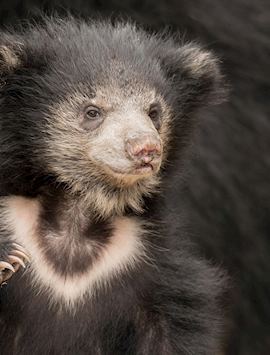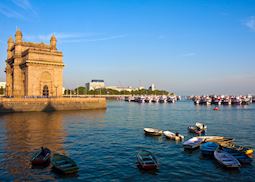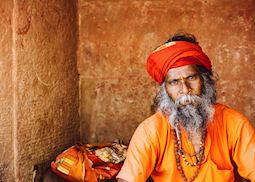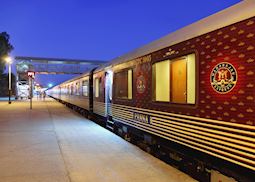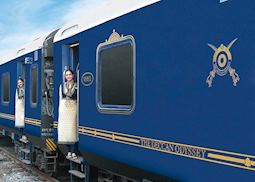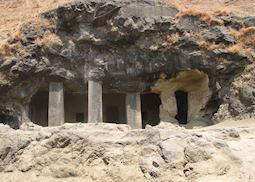Jump to:
At first glance, Mumbai is a mass of furious traffic, frantic noise and people. One of the most populated cities in the world, it sprawls out from its colonial middle to regimented residential housing blocks, ever-growing as people come to make their fortune. With some of India’s wealthiest residents sharing a view with some of its poorest, the contrasts of modern Mumbai, India’s financial hub, become ever more apparent.
Spend a little time here and you can look beyond the contradictions and flaws to see a proud metropolis, with inhabitants keen to show you their city, from the enterprising women in Dharavi slum to hoteliers providing some of the most luxurious experiences in Asia.
India specialist JamesI always think of Mumbai as India's most cosmopolitan city. There’s so much to explore amid the hustle and bustle and it's easy to see the 'real city' — even close to the main sights.
Things to see and do in Mumbai
Take a boat to Elephanta Island
The thin line of Elephanta Island is just apparent through the mist from the ferry port at the Gateway of India. Originally named Gharapuri, Hindi for ‘city of caves’, the island was re-named by the Portuguese after a long since demolished elephant sculpture. The labyrinth of cave temples at the heart of the island are considered to contain some of India’s most impressive temple carvings.
Arriving on the island, you can walk or take a miniature train to the caves, hewn from solid basalt rock and now a UNESCO World Heritage Site. The history of the island is uncertain, but experts agree the caves date from around the 7th century. The majority of them are dedicated to Lord Shiva and decorated with intricate carvings and crisply cut columns.
Enjoy high tea at the Taj Mahal Palace Hotel
Mumbai’s first harbor landmark, the Taj Mahal Palace has been entertaining maharajas, dignitaries and celebrities since 1903. One way to experience its century-old hospitality is visiting for high tea.
High tea is traditionally served around sunset in the sea lounge overlooking the Gateway of India, the Arabian Sea stretching out beyond. Art Deco furnishings and sumptuous fabrics evoke colonial charm. Scones, tarts and sandwiches are served alongside Indian street food such as pakoras (crispy battered vegetables) and vada pav (spicy potato fritters) created by chefs using traditional techniques.
Tour Mumbai at dawn
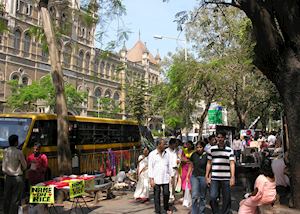 Nicknamed the City of Dreams, Mumbai swells with millions of people every year who arrive in search of a better future. The resulting industrious bedlam is best seen in the early morning as the thousands of small businesses that keep Mumbai running begin work.
Nicknamed the City of Dreams, Mumbai swells with millions of people every year who arrive in search of a better future. The resulting industrious bedlam is best seen in the early morning as the thousands of small businesses that keep Mumbai running begin work.
Accompanied by a local guide, you can go behind the scenes to see how the city functions. The tour visits a newspaper sorting facility where millions of newspapers are sorted into seven different languages before being distributed throughout the city, and the nearby marketplace as it receives its daily intake of over 100 tons (220,462 lb) of fresh produce.
Another stop is one of the world’s largest flower markets, where women sit sewing garlands while 20 tons (44,092 lb) of fish is loudly auctioned off in Sassoon Docks close by. The flurry of activity is over and swept away before many have had breakfast.
See the origins of Mumbai in Worli fishing village
Mumbai was built on an archipelago of seven islands with Worli at its heart. The city’s original fishermen settled here, and the fishing village has retained its tradition and culture as the modern metropolis has developed around it. You’ll definitely need a guide as you walk around — the narrow and winding streets were built that way to confuse pirates.
By timing a visit as the morning catch comes in, you can watch the fishermen’s traditional techniques, which haven’t changed for hundreds of years, and the women debating prices. Climbing up to the British-built Worli Fort, it’s possible to see almost the full extent of the Bandra-Worli Sea Link highway, an engineering marvel spanning Mumbai’s coastline.
Visit the Dharavi Slum
You can only really appreciate the size of Asia’s largest slum by looking out the window when flying into Mumbai. The warren of narrow streets is home to more than one million people. It can be smelly (you will encounter open sewers), dirty and overwhelming on occasion, but taking a tour of the slum is an insight into one of the most productive and resourceful communities who live and work here with startling good humor.
A boggling array of micro enterprises operates out of the slum, from potteries and soap makers to recycling and embroidery businesses. Tours are run by a not-for-profit company, which donates the majority of its proceeds to local charities and ensures the tour is culturally sensitive — you’ll be dissuaded from taking photographs.
Witness Bollywood films being created
Creating over 900 films a year, twice the output of Hollywood, the Bollywood film industry is an important part of Mumbai’s culture. The most prolific studios, Sankraman and Balaji, open their doors for visitors to see the mechanics of the industry.
Depending on the filming schedule, you might see movies being shot on set or get a peek into the glamorous make-up room. In a post-production suite, you’ll be shown how visual effects are added and the epic scores are composed and dubbed in. You can watch dancers re-create some famous Bollywood dance routines and even a few stunts in the purpose-built dance studio.
Best time to visit Mumbai
With its coastal position, Mumbai benefits from a continual sea breeze. The light winds help temperatures stay comfortable at around 90°F (32°C) between October and March. The period around Christmas and New Year is a very popular time to go to Mumbai, but it can be very crowded. We don’t recommend travel from late April through to September as the temperatures can reach over 113°F (45°C) and it's rainy season.
Festivals, events and seasonal reasons to visit
- Held in February every year, the Elephanta Festival, named after Mumbai’s Elephanta Caves, takes place in front of the Gateway of India. It’s a celebration of Indian classical music, dancing and heritage crafts.
- Celebrating the birthday of the elephant-headed god Ganesh, the Ganesh Chaturthi Festival takes place in late August or early September. Clay statues of Ganesh are made and then worshiped over a 10-day period involving many ceremonies. On the eleventh day, the statues are carried by an enthusiastic procession to a nearby lake or river, where they’re immersed in the water.
- Mumbai International Film Festival showcases a mix of independent art house films, and Bollywood and Hollywood offerings. Held in October each year, films are subtitled in English making it an accessible way to experience India’s booming film industry.
who's been there
-
617-223-4521617-223-4195
- Make an inquiry
Suggested itineraries featuring Mumbai
Our itineraries will give you suggestions for what is possible when you travel in Mumbai, and they showcase routes we know work particularly well. Treat them as inspiration, because your trip will be created uniquely by one of our specialists.
Places near Mumbai
- Aurangabad 173 miles away
- Sasan Gir National Park 201 miles away
- Bijapur 242 miles away
- Goa 260 miles away
- Ahmedabad 278 miles away
- Maheshwar 281 miles away
- Badami 284 miles away
- Gulbarga 287 miles away
Photos of Mumbai
Our expert guides to exploring Mumbai
Written by our specialists from their own experiences of visiting Mumbai, these guides will help you make the most of your time there. We share both our practical recommendations and the best ways to appreciate Mumbai at its best.
-
Mumbai and Goa: An Indian trip of contrasts ![The Gateway of India, Mumbai]()
Mumbai and Goa: An Indian trip of contrasts
Mumbai and Goa: An Indian trip of contrasts
Goa’s relaxing beaches are a welcome contrast after spending time exploring chaotic Mumbai, according to our India specialists Nick and Louisa. They share their experiences including waking before dawn in Mumbai and delving into south Goa’s secluded beaches.
Read this guide -
What to do in India: our highlights guide ![Sadhu in Varanasi]()
What to do in India: our highlights guide
What to do in India: our highlights guide
Our India specialists pick some of their best things to see and do, and where to stay from the Himalaya to Kerala. Include spotting tiger, staying in a palace in Rajasthan, taking a boat trip down the Ganges and experience one of the country’s many festivals in your trip to India.
Read this guide -
Touring India’s Golden Triangle ![Hawa Mahal in Jaipur]()
Touring India’s Golden Triangle
Touring India’s Golden Triangle
The Taj Mahal is just one of many impressive sights on a tour of India’s Golden Triangle. For first-time visitors, the region offers a tempting taste of the vast range of cultures, historical sites, architecture, religion, food and landscapes that India boasts.
Read this guide -
Luxury rail journeys through India ![The Maharajas' Express Train]()
Luxury rail journeys through India
Luxury rail journeys through India
India specialist and former Mumbai resident Alison shares her experiences of luxury train journeys in India. She has picked out some of the most interesting routes and explains why they’re a fascinating way to explore India.
Read this guide
Accommodation choices for Mumbai
We've selected a range of accommodation options for when you visit Mumbai. Our choices usually come recommended for their character, facilities and service or location. Our specialists always aim to suggest properties that match your preferences.
-
![The Oberoi, Mumbai (Bombay)]()
The Oberoi Mumbai
Mumbai -
![The Leela, Mumbai (Bombay)]()
The Leela Mumbai
Mumbai -
![Room, Trident Nariman Point]()
Trident Nariman Point
Mumbai -
![Deccan Odyssey train]()
Deccan Odyssey
Mumbai -
![Taj Mahal, Heritage and Tower wings, Mumbai]()
The Taj Mahal Palace & Tower
Mumbai
Ideas for experiencing Mumbai
Our specialists seek out authentic ways to get to know the places that could feature in your trip. These activities reflect some of the experiences they've most enjoyed while visiting Mumbai, and which use the best local guides.
-
Elephanta Island & Mumbai City Tour ![Elephanta Island, Mumbai]()
Elephanta Island & Mumbai City Tour
Elephanta Island & Mumbai City Tour
You take the launch from the Gateway of India to the caves on Elephanta Island, which date from around the 7th century. During the previous few centuries the Gupta Empire had been at its height, literature and the arts had flourished and it is thought that the initial impetus for the creation of the caves was derived from this.
View details
.jpg?q=79&w=1920&h=685)


